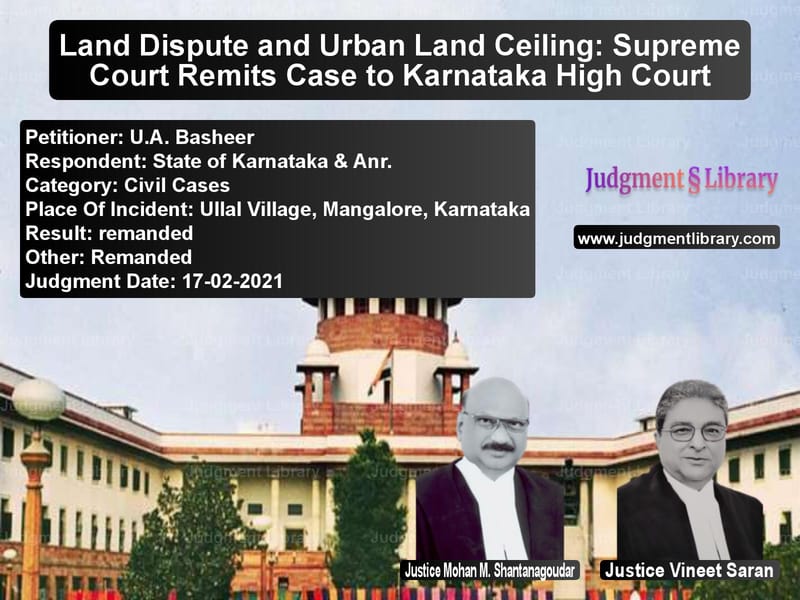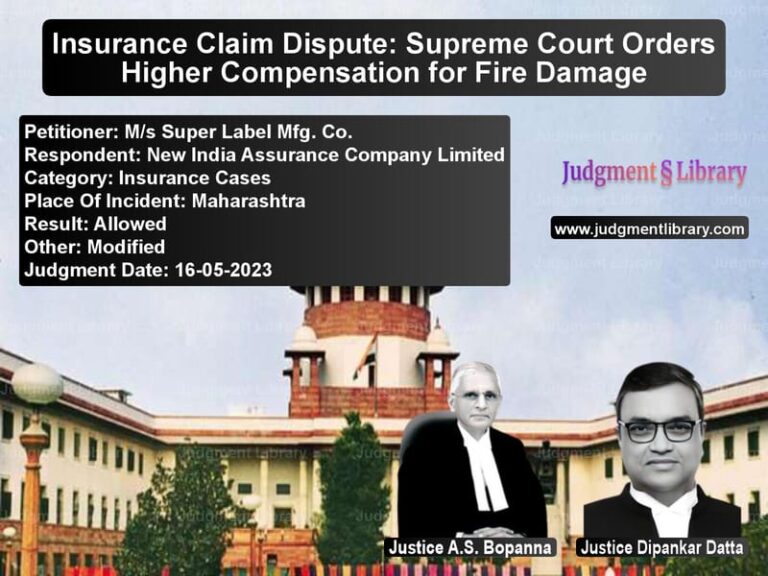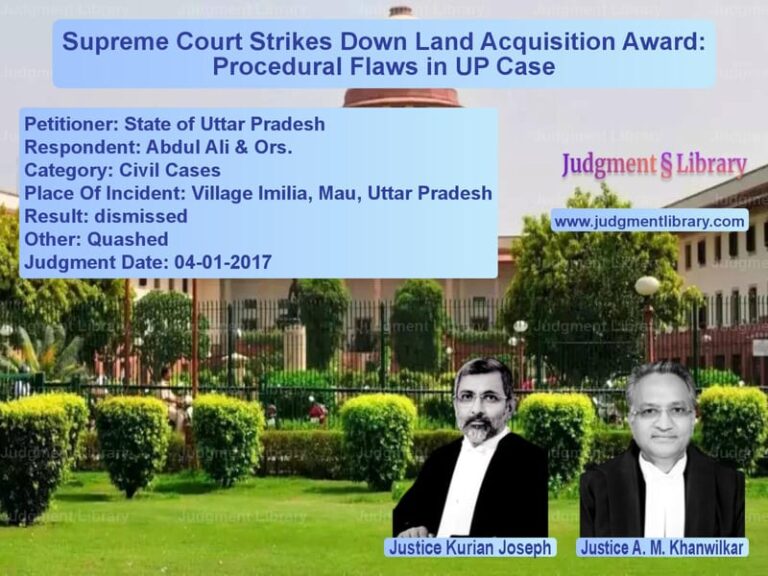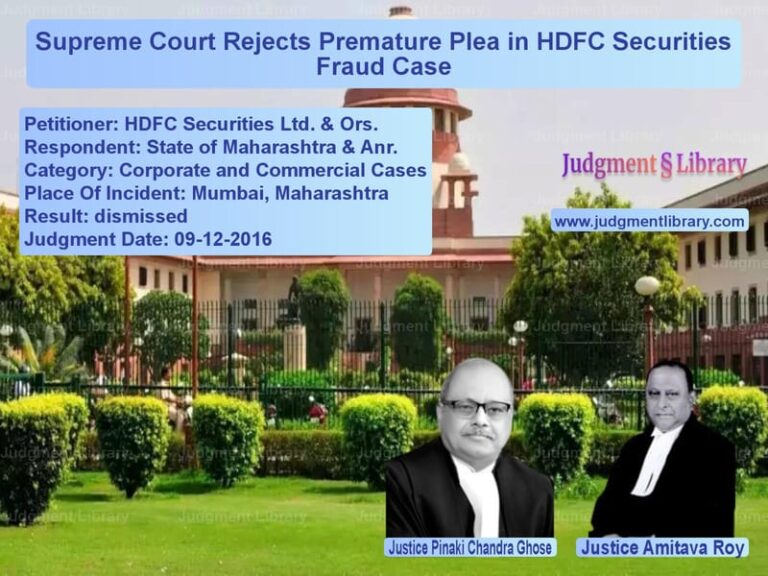Land Dispute and Urban Land Ceiling: Supreme Court Remits Case to Karnataka High Court
The Supreme Court of India recently delivered a crucial judgment in the case of U.A. Basheer vs. State of Karnataka & Anr., dealing with the complexities of land ownership, the impact of the Urban Land (Ceiling and Regulation) Act, 1976 (ULC Act), and the subsequent effects of its repeal in 1999. This case highlights the procedural lapses, factual disputes, and legal intricacies surrounding land acquisition and ceiling laws.
The dispute arose when the State of Karnataka, under the ULC Act, classified certain land holdings as excess vacant land and sought to acquire them. The appellant, U.A. Basheer, challenged the government’s acquisition on the grounds that he had legally purchased the land before it was declared excess under the Act. The Karnataka High Court dismissed his plea, leading to this appeal before the Supreme Court.
Background of the Case
Origins of the Dispute
The case revolves around 3 acres and 11 cents of land located in Ullal Village, Mangalore. The land was originally a joint family property belonging to two sisters, Smt. Korapalu Sapalyathi and Smt. Nemu Sapalyathi, who had ten children between them. After their passing, a partition deed dated 9.01.1984 allegedly divided the property among their children.
However, in 1984, Padmanabha, one of the children, filed a statement under Section 6(1) of the ULC Act, declaring the joint family property as excess vacant land. The government, in response, issued a draft statement under Section 8(1), requiring the surrender of excess land, including Survey No. 53/3A.
Appellant’s Position
U.A. Basheer claimed that he had purchased a portion of the land—14 cents in Survey No. 53/3A—from Leela Sapalyathi, one of the legal heirs, through a sale deed dated 26.03.1994. He asserted that:
- The partition had already granted this land to Leela Sapalyathi.
- The government’s acquisition proceedings were conducted without notifying him.
- He remained in possession of the land even after the government declared it excess.
- Since the ULC Act was repealed in 1999, the proceedings against his land should abate.
State Government’s Position
The Karnataka government argued that:
- The land acquisition was conducted legally as per the ULC Act.
- The partition deed of 1984 was executed after the ULC Act had come into force and was therefore not valid in determining ownership.
- All transactions made after 1984, including the sale to Basheer, were null and void under Section 42 of the ULC Act.
- The government had already taken possession of the land on 12.07.1996, making Basheer’s claim invalid.
Key Issues Considered by the Supreme Court
1. Validity of the Partition Deed
The Supreme Court noted that the partition deed of 9.01.1984 was executed after the enactment of the ULC Act, which meant that the ownership status should be determined based on the situation at the time the Act came into force, rather than at the time of the declaration under Section 6(1).
2. Government’s Acquisition and Possession
The government claimed it took possession in 1996, but Basheer contested this. The Court found that there was no conclusive proof to establish whether the government had effectively taken physical possession before the repeal of the Act.
3. Impact of the ULC Act Repeal
Under Section 3 and Section 4 of the Urban Land (Ceiling and Regulation) Repeal Act, 1999, proceedings would abate unless possession had already been taken. Since the question of possession remained unresolved, the Supreme Court held that this was a crucial fact requiring further examination.
Supreme Court’s Decision
The bench, comprising Mohan M. Shantanagoudar and Vineet Saran, ruled that the Karnataka High Court had failed to examine key factual aspects of the case, particularly possession. Instead of making a final determination, the Supreme Court remitted the matter back to the Division Bench of the Karnataka High Court with the following directions:
- The High Court must verify whether Basheer was in possession of the property at the time of the repeal of the ULC Act.
- If Basheer had possession, the government’s claim over the land would abate under the Repeal Act.
- Both parties were allowed to submit additional evidence to support their claims.
Significance of the Judgment
- This ruling reinforces that land acquisition must be backed by due process and proper documentation.
- It underscores the importance of proving possession in cases where the ULC Act was repealed.
- The case highlights how procedural lapses and delays in legal proceedings can create ambiguity in land ownership.
- The decision ensures that individual property rights are not arbitrarily overridden by the government without following due process.
Conclusion
The Supreme Court’s decision in U.A. Basheer vs. State of Karnataka is a landmark ruling in urban land ceiling laws and their repeal. By remitting the matter back to the High Court, the judgment ensures that the issue of possession is thoroughly examined before deciding whether the proceedings against the land should abate. The case serves as a reminder that even when laws are repealed, unresolved factual disputes can persist, requiring judicial intervention for fair resolution.
Petitioner Name: U.A. Basheer.Respondent Name: State of Karnataka & Anr..Judgment By: Justice Mohan M. Shantanagoudar, Justice Vineet Saran.Place Of Incident: Ullal Village, Mangalore, Karnataka.Judgment Date: 17-02-2021.
Don’t miss out on the full details! Download the complete judgment in PDF format below and gain valuable insights instantly!
Download Judgment: u.a.-basheer-vs-state-of-karnataka-&-supreme-court-of-india-judgment-dated-17-02-2021.pdf
Directly Download Judgment: Directly download this Judgment
See all petitions in Property Disputes
See all petitions in Landlord-Tenant Disputes
See all petitions in Contract Disputes
See all petitions in Judgment by Mohan M. Shantanagoudar
See all petitions in Judgment by Vineet Saran
See all petitions in Remanded
See all petitions in Remanded
See all petitions in supreme court of India judgments February 2021
See all petitions in 2021 judgments
See all posts in Civil Cases Category
See all allowed petitions in Civil Cases Category
See all Dismissed petitions in Civil Cases Category
See all partially allowed petitions in Civil Cases Category







